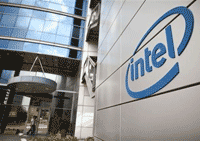
Intel eyes sales pickup, investors cautious
New York, April 18, 2012
Top chipmaker Intel Corporation posted earnings confirming the PC industry is alive - but not kicking - and said sales would accelerate in the second half of the year with a powerful new PC processor.
In a first-quarter earnings report that did not inspire investors to push Intel's recently high-flying stock further, the company also said costs associated with ramping up new production lines would hurt gross margins more than expected.
"It's not that they disappointed, they just didn't give us the bull case. In previous quarters they blew the numbers out of the water," said Patrick Wang, an analyst at Evercore Partners.
The long-time technology bellwether is ramping up production of its newest PC processor, codenamed Ivy Bridge, which is expected to drive sales later this year and power a new crop of super-thin laptops dubbed "ultrabooks."
But the costs of upgrading the factories where the chips are being made is temporarily hurting margins, Chief Financial Officer Stacy Smith told a conference call.
That was bad news to Wall Street, which has pushed shares of Intel 17 per cent higher so far this year.
"They had strong execution for the most part, and in-line expectations for the PC market. But from an investor standpoint you have a multi-year high stock price, very much priced for perfection. That gross margin guidance, while understandable, was not perfection," said Cody Acree, an analyst at Williams Financial Group.
Intel said non-GAAP gross margins in the second quarter would be 62 per cent, plus or minus 2 percentage points, down from 64 per cent in the first quarter. Intel's full-year gross margin forecast of 64 per cent was unchanged.
Shaky economies in Europe and the United States, a growing consumer preference for tablets, and a recent shortage of hard drives due to flooding in Thailand last year have taken a toll on the PC industry.
Demand in China and other emerging economies has helped sustain growth, and CFO Smith said business would pick up more as the industry recovers further from the hard-drive shortage and PC manufacturers replenish low component inventories.
"As we ramp Ivy Bridge and people gear up for these really capable ultrabook sales in the last half of the year, you'll start to see them refilling their pipelines with new products in the back half of this year," Smith told Reuters.
Intel is heavily promoting ultrabooks, which it hopes can stand up to the likes of Apple's Macbook Air, with some of the technological chic the iPad and other tablets epitomise.
Some investors are concerned that expensive components used in them, like solid-state drives, make them too pricey for many consumers. Wang and other analysts speculate Intel may have to sacrifice profit margins on sales of its processors to help make ultrabooks affordable.
Intel says manufacturers are finding ways to bring down costs of ultrabooks, and CEO Paul Otellini told analysts on the call he was confident of the chipmaker's previous prediction the new light-weight PCs would account for 40 per cent of all notebook sales by the end of the year.
"I'm still very confident we can do that. All the signs are tracking there. Everything we've looked at since we first gave that number has gotten more positive, more designs, better price points," Otellini said.
Despite weakness in the United States, global PC shipments in the first quarter grew 1.9 per cent from the year-ago period, research firm Gartner said last week. That was better than the firm's previous forecast of a 1.2 per cent decline.
With worldwide PC sales barely growing, Intel has been racing to find a foothold in smartphones and tablets, where processors based on ARM Holdings' power-efficient chip designs are widely used.
It has recently shown some encouraging signs with announcements that its newest processors would be used in a handful of upcoming smartphones.
Many investors are waiting to see how successful the new handsets become with consumers before declaring the chipmaker a serious player in the mobile market. Growing expectations that Intel will be able to compete in mobile have fueled some of the gain in its shares in recent months.
Microsoft's long-awaited launch of Windows 8 expected later this year is also likely to cause a jump in PC sales, but the operating system will be Microsoft's first version of Windows that is compatible with chips designed by rival ARM.
Intel could face new competition in low-end PCs from companies like Nvidia Corporation and Qualcomm.
Intel said revenue in the current quarter would be $13.6 billion, plus or minus $500 million. Analysts on average had expected $13.45 billion, according to Thomson Reuters I/B/E/S.
The world's leading chipmaker said revenue in the first quarter was $12.9 billion, up from $12.85 billion in the year-ago period and a bit higher than the $12.85 billion expected.
GAAP net income in the first quarter was $2.74 billion, down from $3.16 billion in the year-ago period.
GAAP earnings per share were 53 cents, better than the 50 cents expected.
Shares of Intel fell 2.81 per cent in extended trade after closing up 0.23 per cent at $28.47 on Nasdaq. – Reuters







